#<- tag for my very own posts
Explore tagged Tumblr posts
Text
🪲 intro post 🪲
this won’t be long but i’ll add a cut if you want to skip
🥤 pfp is by @dirtboy !! thank you again :]]
🪱 call me bug/bugs/bugsoda! if you so wish.
🐜 17
🐛 i’m open to asks, whether that be questions, observations, insane shit, whatever you want as long as it’s. not mean.
🪰 dni terfs, bigots, etc. etc. not afraid to block. also NSFW (again, minor)
🪳 mutuals feel free to talk/tag me in things
🦟 i post stuff related to goblincore, queerness, and solar/eco punk if that interests you ! i also reblog a bunch of random shit
🐞 despite my url i do NOT know anything about bugs. if you do i would appreciate bug facts
🦗 be prepared and also follow me. foleow. em.
40 notes
·
View notes
Text
Friendly reminder that if you talk about how representation is important and how there's not enough diverse media, I implore you to seek out the media that already exists. And if you live in an area with a public library, go to see if they're available at your public library. And then go check them out.
As a librarian, it is demoralizing to see how low the circulation statistics are on lgbt+ books and books by BIPOC authors. I include them in displays and readers advisory, but people still don't check them out as much. Libraries only have a finite amount of resources, including space. We don't get a book then keep it forever. If not enough people check it out, we have to get rid of it to make room for more books. And when James Patterson Book #69 gets checked out 30 times in one year and cool, subversive Sci fi novel with a Black trans woman main character has never been checked out once, the librarian (me) has to make a hard decision.
If you're looking for something tangible and easy to do this pride month, look for lgbt+ books (there are millions of lists online that you can find. It's easier than it's ever been to find diverse books) and check them out from your library.
No time to read? Look for a short story or poetry anthology and just read as much as you have time for. Or just check out a book cus it looks interesting and read as much as you can. We have movies too.
As cool as it would be for me to just keep the books I want and get rid of the ones I don't, I have to listen to the community on matters of collection development. And the community tells me what books they want by checking them out and leaving the ones they don't want on the shelf.
If you think this doesn't apply to you because you live in a progressive area and obviously the books are being checked out, you're wrong. I once worked in a community with a large lgbt population. Those books were not getting checked out. If you want to tell me you live in a conservative area and your library doesn't have any diverse books, you are legally obligated to check the catalog before replying to this post. I currently work in a conservative community and we have lgbt+ and bipoc books. And if you still cannot find any, you are legally obligated to see if your library has a collection request form that patrons can fill out before replying to this post.
#bookblr#library posting#pride#pride month#adding tags because i genuinely would like this to leave containment#been weeding alot and it is so demoralizing to see so many of my own community's books on the chopping block#lesbian#read with pride#booktok#the locked tomb#heartstopper#sorry for the tag spam#but if you think books like heartstopper and tlt aren't at risk because they're popular you would be wrong#alice osman's books have very low circ statistics at my library#murderbot#nona the ninth#the situation is dire#xiran jay zhao
6K notes
·
View notes
Text
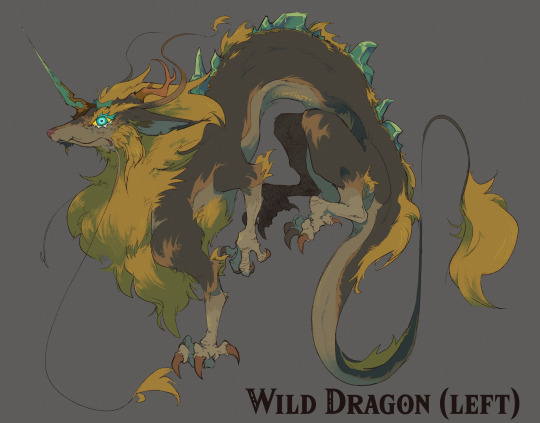
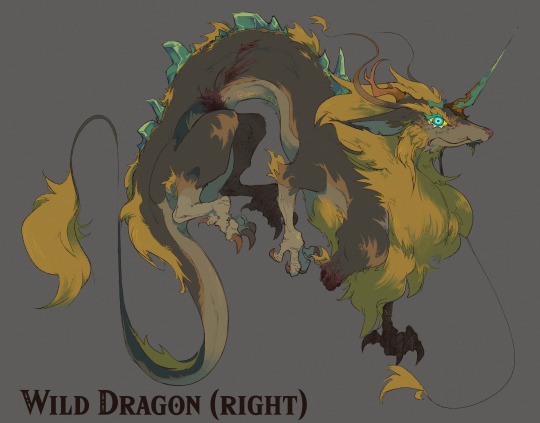
(click for higher quality!) draconified link concept ive been chipping away at this past week ..... here's my funny little compendium concept for him:
"A heroic spirit has taken the form of this bestial dragon. Unlike it's kin, this creature exhibits an extremely aggressive disposition. It appears highly territorial, and will relentlessly chase down those who disturb its skywide patrols - of which it seems to be endlessly searching for either a long-time vassal or foe. Unfortunately, it seems the spirit within has long since forgotten exactly who it was looking for…"
#now. how on earth do i begin to tag this. um.#link#loz#totk#totk spoilers#light dragon#dragon link#loz au#totk roleswap au#there . i'll add more if they come to me LOL#um i can talk about some of my insps i guess?? might make another post too#so mostly i just dont really like turning him into 'light dragon but male' and giving him slightly darker colours or something like that#this also obviously isnt exactly like the botw dragons either though and its a bit more of a mix of other creature concepts i enjoy#since everyone agrees he'd have a farosh horn i wanted to make him a kirin/unicorn :) which is why his tail looks like that#aside from the obvious eastern dragon insps and what ive picked and chosen from the botw dragons#and obviously this looks a lot like wolf link. thats on purpose#i wanted to give him some fierce deity design refs too but because this is so dark/earthy they didnt look very fitting#but honestly you could do a whole fierce deity dragon design on its own i think#okay lots of tags but IVE THOUGHT ABOUT THIS FOR A WHILE. okay. let me have this.#my art#dragon link au
5K notes
·
View notes
Text
there’s something extremely extremely creepy about taking an actor that you have known since they were 13 years old, only JUST a teenager, and making them kiss a fully grown woman the second that they turned a legal adult.
Steve Blackman already has a ton of shit out against him which came out recently so it unfortunately doesn’t surprise me that he would write something like this but it makes me genuinely concerned for everything behind the scenes.
There has been a HUGE problem in the Umbrella Academy fandom since season ONE when Aidan was a 13-14 year old of people writing insanely disgusting stuff and defending it because his character was mentally an adult but oh my god did they make it worse. You’d think they’d protect actor & character by avoiding any romantic interaction but instead you have him kiss an actress 15 years older than him. The age gap being the age that he was when they filmed season two. Quite honestly I feel that if he could’ve done this seasons previously and gotten away with it then he definitely would’ve done it, given the jokes that are actively made.
Quite honestly may Steve Blackman never work again if this is how he treats his actors because this is awful. I’m not even done with the season but that gave me very little desire to continue and this show has been important to me in ways I can’t explain. Maybe I am blowing this out of proportion but it feels so insanely creepy and horrific to me and I needed to rant.
#I could get into a whole thing about aidans dad being weird too#idk the vibes about that dude make me worry indefinitely#he seems to be very alone and have an awful system around him#i hope the best for him truly#i see people going off in the tags about him being a zionist but this proves my point of him having a horrible system around him#it’s well known his dad controls his social media and the dad posted the exact same thing + went off on his own account about it all#which is what i mean by the first tag#the system he is in seems to be awful and continuously harmful all around#and until we get any actual comments from him verbally then id refrain from calling him that#personally at least. i just feel its a very complex situation#five hargreaves#five hargreeves#the umbrella academy#the umbrella academy spoilers#tua#tua spoilers#umbrella academy spoilers#ua spoilers#spoilers#aidan gallagher
931 notes
·
View notes
Text
The Narrator's perspective only gets more horrifying the longer you think about it. Like, imagine being an Echo of yourself—one of many, all made to serve a very particular purpose and knowingly living on borrowed time, if 'living' is even the right word for your current state of pseudo-existence.
You've inherited the mission of a dead man—it's literally the only thing left that you can do before fading, so you sure as hell better believe in it; the alternative would be unbearable. Only you keep failing. With every loop that you don't remember, your lack of agency in this situation becomes starker—you can influence small things, sure, but it becomes increasingly clear that you have no real power, no matter how personally invested you are in the events unfolding in front of you. You are, after all, only an Echo. You've forfeited the right to meaningfully engage with the world.
Worse—every loop you're made aware of is another time you've failed, with unimaginable consequences, though you had no control over these previous iterations of yourself and can't even learn from their mistakes. Everyone around you is operating on a shared perception of reality that you are not part of, will never be part of. After a few repetitions, you are, ironically, the least informed person in the room. All you have left to go on is an evidently outdated script. At the same time, everyone else is experiencing a contiguous version of you, comprised of parts that are, in some sense, also you, while at the same time existing at a complete remove from your current perception of self. Whatever you don't know you did—that's you now. You are, after all, only an Echo. You've forfeited the right to define your own identity, never mind know what it is.
Even worse—this has trapped you within a stagnant hell of your own creation. Nothing you say or do really matters in terms of your own self (the rest of the world is a separate issue entirely). Anything you've come to believe—say, for totally hypothetical example, that you were wrong actually and your envisioned paradise is really a hell beyond any you had the capacity to envision—has about as much permanence as a drawing in the sand. 'You' will continue, exactly as you were, no matter how much you might like to change your behavior. Every possible future has already been set in stone. You are, after all, only an Echo. You've forfeited the right to say anything you haven't already said.
For some reason, no part of any of this has made you feel more comfortable and at peace with the general concept of finality.
The really, truly absolute worst part, though?
There is no one for you to blame but yourself. And that's exactly what turns your story into such a tragedy.
#slay the princess#meta#my meta#slay the princess narrator#stp narrator#stp echo#for the love of god WHAT is his character tag this is a travesty#narrator sweep#natterings#stp posting#this was written as part of another much longer piece of enthusiastic narrator meta#like with screenshots and everything#but this was too good and self-contained NOT to post#in case of the very likely event where i dont finish the full thing#because unlike him i do recognize when im flirting with my own hubris#not that it ever stops me#anyway ask me about the narrator and why hes the most interesting character in stp#who is UNDERAPPRECIATED-- i mean uh#surprisingly overlooked#please there is so much that i could say
511 notes
·
View notes
Text
I think what a lot of j&h adaptations get wrong, is that ultimately, Jekyll is, at heart. A Cunt. Lots of adaptations like to write him as an innocent scientist, who got more than he bargained for when he drank the potion, and unleashed a monster, but in the novella, the only thing the potion really does, is change Jekyll's appearance. He created Hyde, and I think he had the opportunity to make Hyde into something good, but, because he's a cunt, he chose to use his alter ego as a force for evil and chaos. "Edward Hyde was alone in the ranks of evil"- of course he was, you never allowed him to be anything else. And Jekyll is fully aware of what he does as Hyde, he says it himself in his full statement, and he feels no remorse. He didn't create Hyde accidentally, he made Hyde because he wanted to do bad things and get away with it, without damaging his reputation.
Fuck Dr Jekyll, all my homies hate Dr Jekyll.
#my random stuff#jekyll and hyde#the strange case of dr jekyll and mr hyde#henry jekyll#edward hyde#i was tempted to tag tumblr user jekyll-hatepage on this post but I'm sure they'll find it of their own accord#anyway this is kind of why my blog title is edward hyde apologist. jekyll could've chosen to just; not do terrible things and he didn't#this post was inspired by me reading TGS last night#don't get me wrong; i love it so much#but tgs jekyll definitely falls into the innocent scientist who got more than he bargained for category#and tgs is good; it's so so good#but j&h is very sacred to me and most variants of jekyll are not My Jekyll#idk if any of this makes sense
553 notes
·
View notes
Note
Holy shit I love your Dirk interpretations, it's so true and I could talk about this shit forever. I feel like another part of his character that people seem to forget (along with Roxy for some reason) is that he's from the future in solitude in an apocalyptic wasteland. I just see that part of his character always removed which is disappointing because I feel like that's a pretty big part, especially regarding his themes around technology, his brother's theme of Time, his own isolation, and how he plays in the vastness of the universe and spacetime.
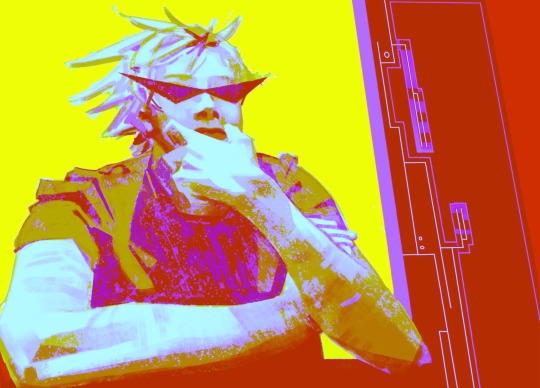
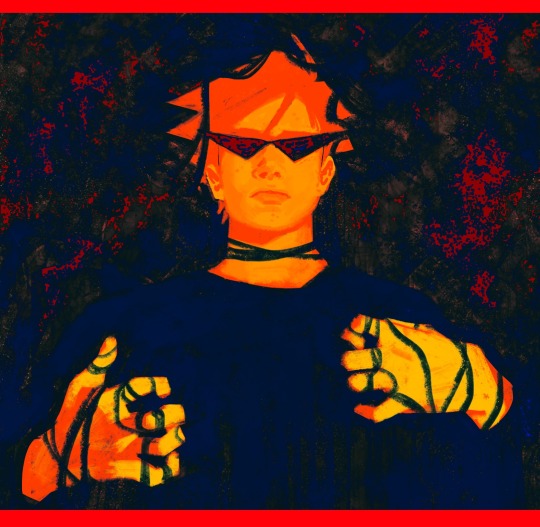
Art I drew related to the subject because I like to respond to asks with art.
But absolutely. I certainly understand where the lack of discussion over his isolation + upbringing comes from, considering a majority of the fanbase that I have seen builds their ideas based on their own version of postcanon. I’m not entirely sure how that would be fixed, but certainly even in the somewhat recent past I would see a lot more content regarding his upbringing both literally and symbolically. I don’t have much to add regarding the things you’ve mentioned, because they just are what they are. Dirk being confined to a singular room left to him by a father figure he never met, in a future where the only other person left on the planet is someone he cannot pursue a relationship of because of himself, with purely 3 robots to keep him companion, one being an exact replica of his own brain who is *also* trapped inside a pair of glasses, is about as literal as it gets to me.
The contrast to me involving the flooded, organic world in comparison to the little speckle of Dirk’s apartment packed with the dude and his technics is not only a representation of his isolation and entrapment within himself, but also of his lack of control. I think his obsession with & themes of control are a direct product in the case of Dirk specifically *of* this kind of upbringing. His themes of technology are also related to his themes around control. So much of his character is actually revolved around this to me like so much. Dirk is so deeply disconnected from humanity in every way and so much of his character + symbolism is based around that.
It doesn’t even have to be about the symbolism or anything though. It’s just pretty *interesting* in the literal sense that he lives in the middle of the ocean in the future. There’s not only a lot to theorise on to do with his young life there, but on how it might affect him in the way he acts for the rest of his life. The latter part is probably what I see mentioned the most by people talking about Dirk regarding this, I’m surprised I don’t see more discussion on the former too though. I really ought to actually talk more about Homestuck stuff on here. I will do it myself.
Roxy & Dirk’s relationship is largely ignored though because there is a narrative a certain demographic spreads that Dirk resented and blamed Roxy for her interest in him, and thus too many people believe that their relationship was or would continue to be an abusive one. Realistically, I believe it’s important to acknowledge that the way Roxy treated Dirk regarding his homosexuality wasn’t right while still acknowledging the obvious amount of respect and admiration Dirk had for Roxy. I mean we have a huge piece of dialogue from their post trickster mode conversations on the quest beds from Dirk purely stating how he feels about Roxy that people completely ignore somehow. I think this usually happens to characters that are women though. I know everyone says it, but it is true. Jane gets the exact same treatment of boiling her down to solely her negative aspects. The things I see completely mischaracterising both of them are horrific.



I mean how much more explicit can it get that their relationship is obviously very important to Dirk? But I digress. I think the best or I should say “most interesting” interpretations of their relationship usually come from DirkRoxy shippers actually.
I would be interested to hear about Dirk’s relation to his brother’s theme of time though. I don’t have any thoughts on this and I don’t recall ever hearing anyone talk about it before. If you or anyone else would be willing to enlighten me I’d be thrilled.
#homestuck#homestuck fanart#hs fanart#dirk strider#blooby posting#ask#Sorry for taking so long to reply to you on this. I’ve been in more of a drawing than a speaking mood lately#which is very unusual for me. This is definitely not as much of a post as it could be but I’m still not back on my thought and speech game#I know the Roxy mention was in brackets but good lord the treatment Roxy gets from fanbase is insane. Couldn’t help myself#Sorry if anything is worded badly. I’m tired per usual#I think (with no malice in my heart) people just tend to leave out what they don’t like about characters though.#I was very briefly talking with Pomme johnegbertirl#and it got me thinking about how far a lot of people’s interpretations of characters stray from what would be realistic to canon#based on their own biases. Which I guess I probably do too to a certain degree.#I’m not one to judge people for their characterisations at all#I tend to be very forgiving when it comes to reads#but… I admit that is indeed a little disappointing to see how completely ignored some parts of his characters are.#Sorry for tangent that is tenuously related. It is relevant enough to shove haphazardly into tags#I’m glad you like my Dirk ramblings though. Thanks brother#We live on
855 notes
·
View notes
Text
Very interesting to me that a certain subset of the BES fandom's favourite iterations of Mizu and Akemi are seemingly rooted in the facades they have projected towards the world, and are not accurate representations of their true selves.
And I see this is especially the case with Mizu, where fanon likes to paint her as this dominant, hyper-masculine, smirking Cool GuyTM who's going to give you her strap. And this idea of Mizu is often based on the image of her wearing her glasses, and optionally, with her cloak and big, wide-brimmed kasa.
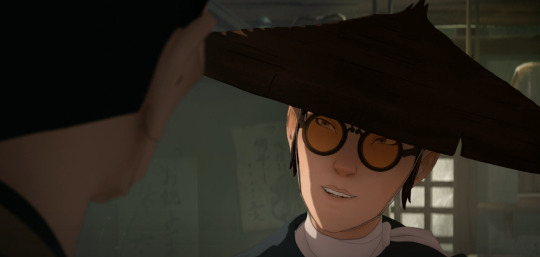

And what's interesting about this, to me, is that fanon is seemingly falling for her deliberate disguise. Because the glasses (with the optional combination of cloak and hat) represent Mizu's suppression of her true self. She is playing a role.

Take this scene of Mizu in the brothel in Episode 4 for example. Here, not only is Mizu wearing her glasses to symbolise the mask she is wearing, but she is purposely acting like some suave and cocky gentleman, intimidating, calm, in control. Her voice is even deeper than usual, like what we hear in her first scene while facing off with Hachiman the Flesh-Trader in Episode 1.
This act that Mizu puts on is an embodiment of masculine showboating, which is highly effective against weak and insecure men like Hachi, but also against women like those who tried to seduce her at the Shindo House.
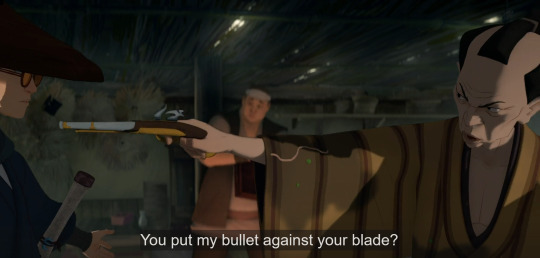

And that brings me to how Mizu's mask is actually a direct parallel to Akemi's mask in this very same scene.
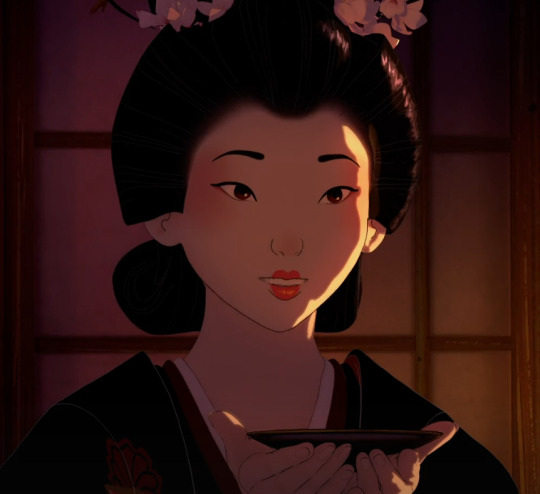
Here, Akemi is also putting up an act, playing up her naivety and demure girlishness, using her high-pitched lilted voice, complimenting Mizu and trying to make small talk, all so she can seduce and lure Mizu in to drink the drugged cup of sake.
So what I find so interesting and funny about this scene, characters within it, and the subsequent fandom interpretations of both, is that everyone seems to literally be falling for the mask that Mizu and Akemi are putting up to conceal their identities, guard themselves from the world, and get what they want.
It's also a little frustrating because the fanon seems to twist what actually makes Mizu and Akemi's dynamic so interesting by flattening it completely. Because both here and throughout the story, Mizu and Akemi's entire relationship and treatment of each other is solely built off of masks, assumptions, and misconceptions.
Akemi believes Mizu is a selfish, cocky male samurai who destroyed her ex-fiance's career and life, and who abandoned her to let her get dragged away by her father's guards and forcibly married off to a man she didn't know. on the other hand, Mizu believes Akemi is bratty, naive princess who constantly needs saving and who can't make her own decisions.
These misconceptions are even evident in the framing of their first impressions of each other, both of which unfold in these slow-motion POV shots.
Mizu's first impression of Akemi is that of a beautiful, untouchable princess in a cage. Swirling string music in the background.
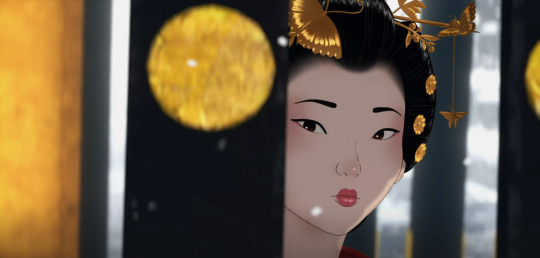
Akemi's first impression of Mizu is of a mysterious, stoic "demon" samurai who stole her fiance's scarf. Tense music and the sound of ocean waves in the background.

And then, going back to that scene of them together in Episode 4, both Mizu and Akemi continue to fool each other and hold these assumptions of each other, and they both feed into it, as both are purposely acting within the suppressive roles society binds them to in order to achieve their goals within the means they are allowed (Akemi playing the part of a subservient woman; Mizu playing the part of a dominant man).
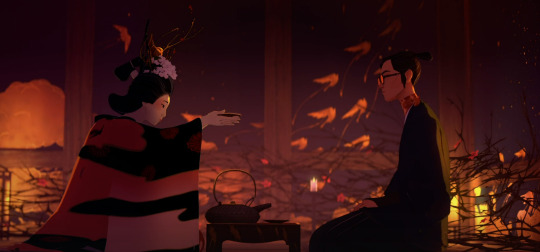
But then, for once in both their lives, neither of their usual tactics work.
Akemi is trying to use flattery and seduction on Mizu, but Mizu sees right through it, knowing that Akemi is just trying to manipulate and harm her. Rather than give in to Akemi's tactics, Mizu plays with Akemi's emotions by alluding to Taigen's death, before pinning her down, and then when she starts crying, Mizu just rolls her eyes and tells her to shut up.
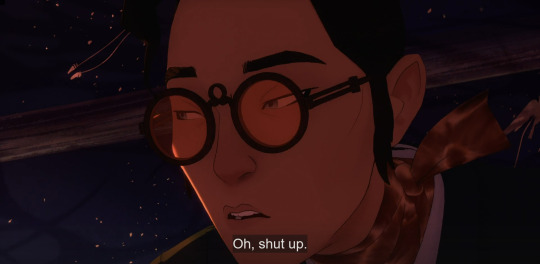
On the opposite end, when Mizu tries to use brute force and intimidation, Akemi also sees right through it, not falling for it, and instead says this:
"Under your mask, you're not the killer you pretend to be."
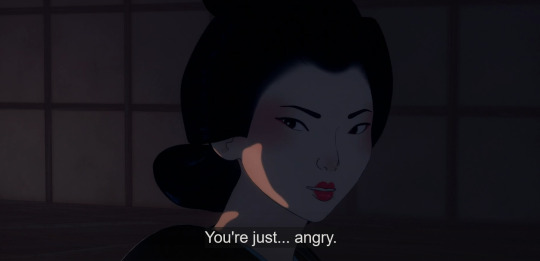
Nonetheless, despite the fact that they see a little bit through each other's masks, they both still hold their presumptions of each other until the very end of the season, with Akemi seeing Mizu as an obnoxious samurai swooping in to save the day, and Mizu seeing Akemi as a damsel in distress.
And what I find a bit irksome is that the fandom also resorts to flattening them to these tropes as well.
Because Mizu is not some cool, smooth-talking samurai with a big dick sword as Akemi (and the fandom) might believe. All of that is the facade she puts up and nothing more. In reality, Mizu is an angry, confused and lonely child, and a masterful artist, who is struggling against her own self-hatred. Master Eiji, her father figure who knows her best, knows this.
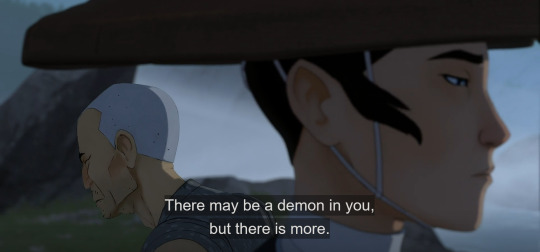
And Akemi, on the other hand, is not some girly, sweet, vain and spoiled princess as Mizu might believe. Instead she has never cared for frivolous things like fashion, love or looks, instead favouring poetry and strategy games instead, and has always only cared about her own independence. Seki, her father figure who knows her best, knows this.
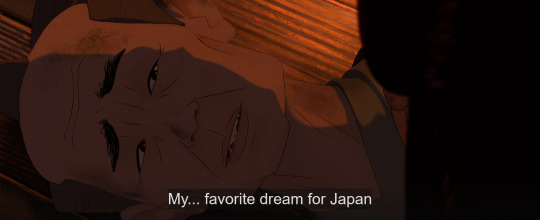

But neither is she some authoritative dominatrix, though this is part of her new persona that she is trying to project to get what she wants. Because while Akemi is willful, outspoken, intelligent and authoritative, she can still be naive! She is still often unsure and needs to have her hand held through things, as she is still learning and growing into her full potential. Her new parental/guardian figure, Madame Kaji, knows this as well.
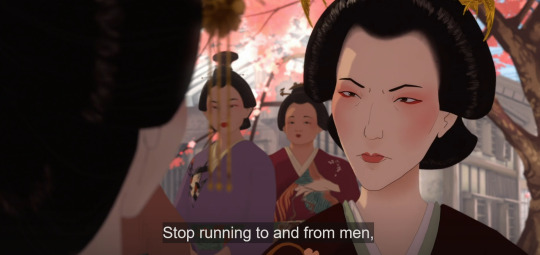
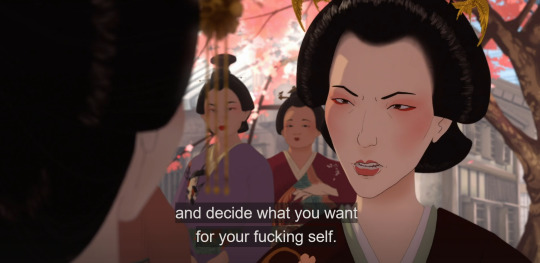
So with all that being said, now that we know that Mizu and Akemi are essentially wearing masks and putting up fronts throughout the show, what would a representation of Mizu's and Akemi's true selves actually look like? Easy. It's in their hair.
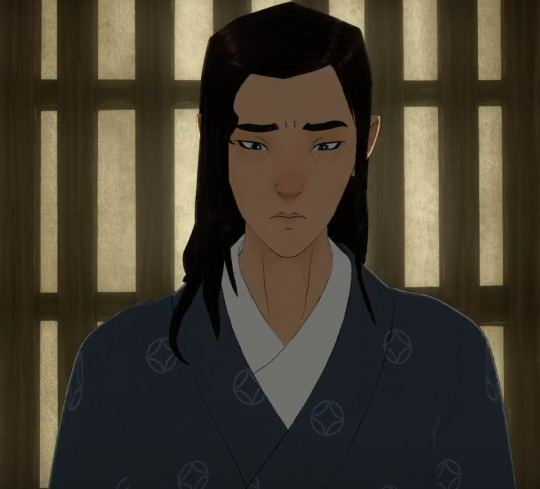

This shot on the left is the only time we see Mizu with her hair completely down. In this scene, she's being berated by Mama, and her guard is completely down, she has no weapon, and is no longer wearing any mask, as this is after she showed Mikio "all of herself" and tried to take off the mask of a subservient housewife. Thus, here, she is sad, vulnerable, and feeling small (emphasised further by the framing of the scene). This is a perfect encapsulation of what Mizu is on the inside, underneath all the layers of revenge-obsession and the walls she's put around herself.
In contrast, the only time we Akemi with her hair fully down, she is completely alone in the bath, and this scene takes place after being scorned by her father and left weeping at his feet. But despite all that, Akemi is headstrong, determined, taking the reigns of her life as she makes the choice to run away, but even that choice is reflective of her youthful naivety. She even gets scolded by Seki shortly after this in the next scene, because though she wants to be independent, she still hasn't completely learned to be. Not yet. Regardless, her decisiveness and moment of self-empowerment is emphasised by the framing of the scene, where her face takes up the majority of the shot, and she stares seriously into the middle distance.
To conclude, I wish popular fanon would stop mischaracterising these two, and flattening them into tropes and stereotypes (ie. masculine badass swordsman Mizu and feminine alluring queen but also girly swooning damsel Akemi), all of which just seems... reductive. It also irks me when Akemi is merely upheld as a love interest and romantic device for Mizu and nothing more, when she is literally Mizu's narrative foil (takes far more narrative precedence over romantic interest) and the deuteragonist of this show. She is her own person. That is literally the theme of her entire character and arc.
#blue eye samurai#mizu blue eye samurai#akemi blue eye samurai#blue eye samurai meta#just in case... im gonna tag this as#mizukemicritical#akemizucritical#though this post isnt actually criticising the ship itself but rather fanon's portrayal of the ship and the characters#for that reason lemme also tag this as#wank.mp3#feel free to disagree of course but please be civil#and if you need to rant about how wrong i am without any convincing evidence kindly feel free to make your own post. peace and love <3#fandom.rtf#meta dissertations.pdf#shut up haydar#edit: for full disclosure. i do rather dislike this ship. but obviously it's fine for anyone to enjoy it. please do! have your fun!#it's just that as usual! popular fanon and fandom around a ship is what has completely deterred me from any sense of enjoyment of it#it's a shame too because i was very open and even eager for some mizu/akemi romance in the future#but out-of-character fanon + the rudeness of certain fans has definitely soured it for me#but that doesn't mean people can't enjoy it obviously! ship and let ship!!!#plus it has its appeal which i DO STILL see and enjoy!!!!#i would even go as far as to call them soulmates because their narratives and characters are LITERALLY intertwined!!!#but. yeah. my gradual distaste for this ship is indeed very unfortunate.
830 notes
·
View notes
Text
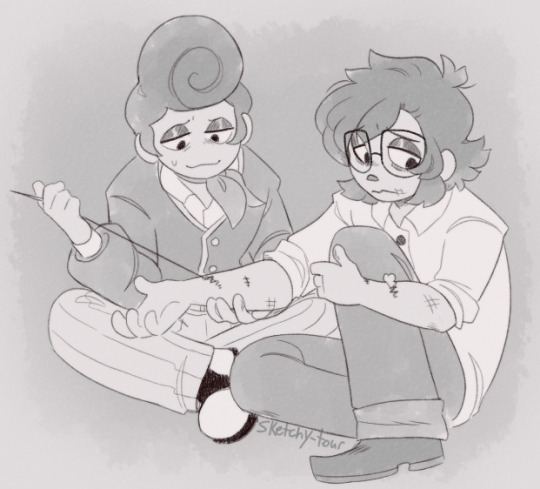
HELLO HI HELLO I AM!!! RECOVERING CURRENTLY!!!!
So I haven't posted in a small moment and planned to get myself going again soon but right now I am recovering from an accident (I won't get into the nitty gritty) that has left me quite shaken. FIRST OFF I AM OKAY! Minor injuries so nothing alarming I am physically fine besides being sore for a bit and some scrapes and bruises that are still healing, including my arms which is making drawing a bit difficult. I'm slowly getting better but cant really draw for long periods and honestly I might not draw much for a bit till I feel better both physically and mentally. its the mentally part that might take some time. But I'm resting, rest assured!
ANYWAY this is more just an update cause I know i've been a lil absent. ESPECIALLY after this accident. I'm not abandoning the blog by any means, def still check on tumblr but couldn't seem to muster the energy to interact with much at the moment as my brain is a little rattled up.
I hope yall are all okay! I hope your days are bright and yall are taking care of yourselves!
I promise I'm doing what I can to take care of me!
#update#just rambling#my art#dont wanna really add this to the welcome home tags?#feels inappropriate? even with the doodle but the post itself is just to let anyone wondering about me know I'm alright#anyway#I probably shouldn't have pushed through drawing this but I mostly drew it for my own comfort if anything#and felt fitting to use for an update post#art looks so sloppy lol but thats okay....#Repeating that I am very much okay though! But I'm def needing some time. For my mind's sake. Too much noise around me gets overwhelming#so energy is low and I am taking my time#dandy leon#I dont mind adding my oc tag lmao#tw stitches
568 notes
·
View notes
Text
i think the thing that annoys me most about 'bad dad' clark fics is the fact that they feel really mean-spirited about superman in general. almost like they're telling ppl 'seee! superman's not great after all! he's just as bad as you and me! in fact, he's worse! look at how he's treating this innocent child' and it's almost like lex luthor himself is running a smear campaign on ao3
#making this its own post because nothing takes me out of a perfectly good fic more than when they suddenly go like#'remember how awful clark was to you kon? remember how much he sucked?'#like joke's on you lex luthor superman IS that good#clark kent#superman#conner kent#kon el#superboy 1994#salt tag#i'm sorry pls block my salt tag if u want guys i'm normally not a very negative person 😭😭'#superfam
354 notes
·
View notes
Text
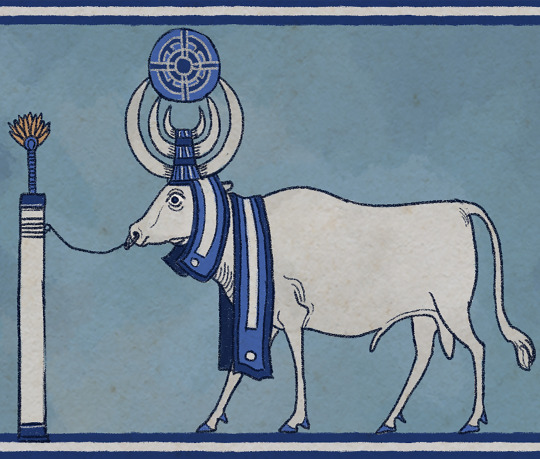
The god Od depicted in a symbolic representation of the word's creation as a docile bull awaiting sacrifice at the altar.
It carries the foundations of the world in its horns (via a very old cross and wheel motif representing cyclical totality, now mostly used as a visual shorthand for the world). It has three sets of horns in the form of the lunar crown, a mostly obsolete symbol of Wardi royalty. The altar is decked with an orange lily motif, after a hardy native water lily capable of regrowth in waters that dry seasonally. This symbol of rebirth and fertility in a sacrificial scene evokes the sacrifice-rebirth cycle initiated by Od's primordial slaying, which is fundamental to the world's functioning.
This is a rundown on interpretations of the god Od, a deity that has a long history in the lands surrounding the Mouth of the eastern inner seaway, and the impact (or lack thereof) of its primordial sacrificial nature in religious practice.
The god Od appears in religious practices throughout the region, having the utmost significance to the Imperial Wardi faith and lesser or separate significance elsewhere. The five religious practices wherein variants of Od has longstanding historical significance are the Burri Faith, the (Imperial) Wardi faith, the Old or 'Heathen' Wardi faith, the faiths of the Hill Tribes, and the Wogan faith.
—
The name Od and most significant elements of this god have origins in the Burri faith, which was transferred across the sea to the Wardi, Wogan, and Hill Tribes in the time of its second and third empire.
The Burri Od is described as having been the first being. The universe began as a cosmic sea and empty, eternal sky, loosely representative of a primordial and fundamental female and male dualism. Od appeared at their borders as a result of their interfacing, in the form of a giant aurochs or bison whose hooves touched the seafloor and horns touched the sky. He dipped his head down to the silt and lifted it out of the sea in his horns, thus forming the foundations of the world. His semen spilled into the cosmic sea and created the first seven gods, who then killed and divided their father, giving the world its form with his body.
While significant to the creation story, Od is of relatively little importance in everyday practice of the Burri faith and is not commonly worshiped (rather his seven children are, as they were the original and most powerful group of gods and created life).
Though the Burri Od takes on a sacrificial role in creation, animal sacrifice is not central to the Burri faith and is only performed in specific contexts (some festivals and holidays, in times of great strife, and to a few specific gods within a wide pantheon). The Burri faith does not involve a sacrifice-rebirth cycle as foundational to the world's functioning and god's health, and offerings are instead mostly gifts to please and rightly venerate the gods (or avert the malice of less savory deities). Offerings of food, drink, and precious materials are preferred by most gods. When animal sacrifice does occur, bulls ARE generally favored, as a reflection of their primordial counterpart.
—
The modern/Imperial Wardi Od is partly an import of the Burri tradition, which fused with both native monotheistic/animist worldviews and animal cults during the reign of the 2nd Burri Empire and developed into a new faith, which has presently become the state religion of the Wardi Empire.
‘Od’ in the Imperial Wardi context is best translated as capital G ‘God’ (anyone saying 'God' is, in-universe, saying the word 'Od'). Its creation of the world plays out in a very similar fashion, but the first human life (rather than other gods) is created by Its semen mingling with the cosmic sea. It willingly sacrificed Its body at the hands of the first people, who formed the world with its remains. Its shed blood spattered the earth and can be found today as meteoric iron, and animal life emerged from the mingling of the blood and the soil. Its death initiated the eternal cycle of sacrifice/death and rebirth, with each begetting the other and necessary for the world to function.
Od's body is dead and the world is Its corpse, but Its spirit survives in seven 'faces' which govern specific functions of reality and society. The connection of Its spirit to Its body is maintained by right practice, right prayer, and right sacrifice (in the form of food/drink offerings, bloodletting, common sacrifices of animals and occasional sacrifices of people).
The Imperial Wardi Od is generally regarded as genderless and dual-sexed, and referred to with a unique deified pronoun most effectively translated as capital I 'It'. Its sex is of relatively little significance to everyday religious practice, and discussions of Its dualism are more likely to occur in scholarly and philosophical contexts (like debates on the minutia of how Its semen, milk, and menstrual blood are all mentioned in old accounts of creation, and how the implications of this should translate to body politics and taboo).
—
The Old Wardi or ‘Heathen’ Wardi faith is a separate branch of old ethnic Wardi religion with significantly less Burri influence. This is a minority practice that only survives intact in isolation. Its practitioners are often hostile to all foreign influence and the Imperial Wardi faith, and suffer minority status and religious suppression.
Its version of Od is a more intact surviving remnant of ancient Wardi monotheism, as an androgynous creator god who lost physical form in the act of creation, and lives on as innumerable spirit aspects of its whole. This deity is referred to as Od in describing its primordial form, but is mostly referred to as a unique word for spirit, which is 'the Koya'. Practitioners of the old faith often identify the seven-faced Od as a twisted, foreign misinterpretation of the Koya.
This practice is somewhat animistic in nature and involves veneration of individual spirits that form a larger whole. Every aspect of the world has a spirit (plants, animals, minerals, bodies of water, etc) that exist in an ideal balance and as strands of an interconnected death-rebirth cycle. Each spirit is referred to as 'the [noun]-koya'. All discrete forms of life/matter have at least one attached Koya, while living beings also have a soul (which is separate from the Koya and reincarnated upon death).
Each Koya exists as a quintessential essence (ex: the lion-koya, the maize-koya, the iron-koya, the salt-koya) rather than separate individual objects having separate individual Koya, though unique landmarks do have their own (the Brilla River-koya is separate from the Yellowtail River-koya, though both share the freshwater-koya). Each individual may have multiple spirits (geese have the goose-koya, but also the bird-koya, the freshwater-koya, etc), a system that categorizes the world by intrinsic natures and precisely dictates how each physical body has unique metaphysical significance.
Animal sacrifice plays a somewhat similar role in Old Wardi religion to Imperial Wardi religion in the sense that it intends to maintain the stability and oneness of the divine spirit and a death-rebirth cycle. In this case, in freeing part of the spirit, balance can be brought to the Koya totality and restore the death-rebirth cycle. (Ex- in times of drought, the sacrificial release of the migratory goose-koya can encourage the return of the rains). This is far from the only way to re-balance the Koya. The most significant rites come in the form of songs that summon, release, or expel individual Koya as needed.
—
The Od of the Hill Tribes is a mingling of the Burri/Wardi Od and a much older goddess of fertility and agriculture, and is strongly associated with cattle and barley. This version of Od did not create the world and is only one of many gods, though she is said to have been born from the sea and carried up fertile soils with her (which is likely a direct result of Burri/Wardi influence). A few tribes venerate Od as a chief or patron god, though none are fully monotheistic (outside of converts on individual or clan levels).
She has a distant common ancestor with the Finn goddess Morgren (as the various Hill Tribes are descendants of a single proto-Finn population who migrated across the Viper seaway in prehistory), who is also a goddess of agriculture associated with fertility and barley (though in Morgren’s case, she is THE god of the staple crop barley and lacks the cattle association, and has no direct influence from the Burri/Wardi Od whatsoever)
Most of the tribes of Greathill do not practice animal sacrifice but offer grain and fruit to Od, and create a sanctified mix of crushed barley and oil that is anointed on livestock and people to confer Od's blessings of fertility. In some cases, the dominant cow in each herd is considered to belong to Od and will not be milked or slaughtered, and is buried with full rites upon its death.
—
The Od of the Wogan religion is distant to the rest of her counterparts, though has absorbed some Burri and modern Wardi elements over time and is referred to by the same name (a definite foreign import). She shares the fertility aspect ubiquitous to other Od variants, and is occasionally depicted as a cow.
She is a goddess of the earth and sea, who was wed to Iapedi, the god of the sky. The ocean is functionally her womb (which may be trace Burri/Imperial Wardi influence, or merely coincidental) and all life emerged from within.
These are the only two true gods to the Wogan, though there is an additional element wherein the mating of Od and Iapedi also created innumerable spirits found throughout nature that act as an animating life-force. The concept is very similar to the Old Wardi '-Koya' (as the two faiths had close common ancestry), though this one lacks the sort of taxonomical system of its counterpart, and only ascribes spirits to living things. Each spirit in the Wogan religion is distinct (rather than each type of animal, plant, etc potentially having multiple spirits), and the spirits existing in each body are part of a greater whole that exists as a sentient consciousness that can be communed with (ex: each lion has A lion spirit, all part of The lion spirit, the latter of which can be engaged with).
Wogan religion strongly retains ancient animal cult practices common across the ancient Wardi-Wogan sphere, some of which have been translated into the faces of God in the Imperial Wardi context (both religions share commonalities of lions, snakes, albatross, migratory ducks, and cattle being significant sacred animals). The function of animal worship to the Wogan is communication and interface with the greater spirit of each animal (which can range anywhere from gaining personal blessing and protection, to dispelling plague, to 'lay off on eating our crops').
The Wogan faith does not involve animal sacrifice (though ancient variants almost certainly did). This is connected to traditional vegetarianism among the Wogan (as a means to avoid offending animal spirits), which some view as a point of pride and a mark of distinction against their Imperial Wardi majority.
#I don't remember my own tagging system....whatever#blightseed#Should be noted that there are other religions that have adopted Od in various capacities as a result of the Wardi Empire's#expansion/role in the trade network/immigrant communities#But these are very recent adoptions whereas the five of this post have Od influences going back almost a millenia
407 notes
·
View notes
Text
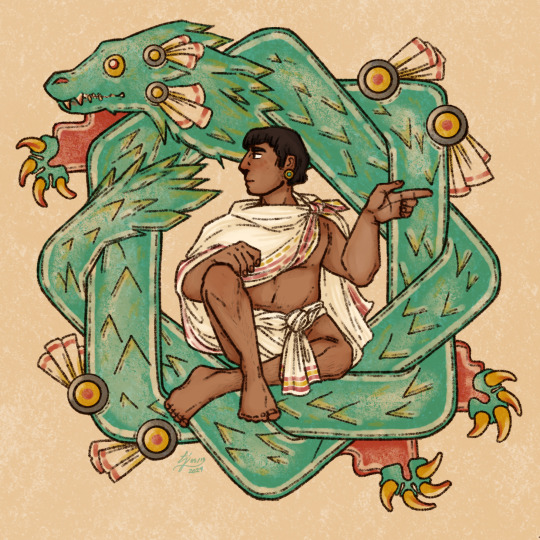
c. 1540 CE: a young man from Chalco, and his dragon.
#em draws stuff#em is posting about temeraire#temeraire#temeraire worldbuilding collection#⚬⚬⚬⚬⚬𐂂#<- tag for organizing when I'm drawing stuff that is temeraireVerse but not in the line of the plot of the books themselves#for school reasons I have been reading a lot about 14th-17th century mesoamerica#and thus am Interested in how that would have potentially played out in temeraireverse...#anyway! not sure if I'll draw these two again but I Have given the lad a day sign name (five deer) so I could Potentially. who can say.#haven't come up with a name for the dragon yet... maybe cipachcoatzin would work if can't think of anything else#<- Please Forgive My Dubious Command of Classical Nahuatl Grammar I Am But A Student#on that note zoomorphic interlace is not very much a style from this period/region but it helps me with composition things#five deer himself is mostly based on the illustration of the tlacuilo's son in the codex mendoza#the dragon is drawn more from a fusion of older scribal styles (ie. the codex borgia) and my own shorthands for dragon anatomy
547 notes
·
View notes
Text
A central element of the myth of [Eleanor of Aquitaine] is that of her exceptionalism. Historians and Eleanor biographers have tended to take literally Richard of Devizes’s conventional panegyric of her as ‘an incomparable woman’ [and] a woman out of her time. […] Amazement at Eleanor’s power and independence is born from a presentism that assumes generally that the Middle Ages were a backward age, and specifically that medieval women were all downtrodden and marginalized. Eleanor’s career can, from such a perspective, only be explained by assuming that she was an exception who rose by sheer force of personality above the restrictions placed upon twelfth-century women.
-Michael R. Evans, Inventing Eleanor: The Medieval and Post-Medieval Image of Eleanor of Aquitaine
"...The idea of Eleanor’s exceptionalism rests on an assumption that women of her age were powerless. On the contrary, in Western Europe before the twelfth century there were ‘no really effective barriers to the capacity of women to exercise power; they appear as military leaders, judges, castellans, controllers of property’. […] In an important article published in 1992, Jane Martindale sought to locate Eleanor in context, stripping away much of the conjecture that had grown up around her, and returning to primary sources, including her charters. Martindale also demonstrated how Eleanor was not out of the ordinary for a twelfth-century queen either in the extent of her power or in the criticisms levelled against her.
If we look at Eleanor’s predecessors as Anglo-Norman queens of England, we find many examples of women wielding political power. Matilda of Flanders (wife of William the Conqueror) acted as regent in Normandy during his frequent absences in England following the Conquest, and [the first wife of Henry I, Matilda of Scotland, played some role in governing England during her husband's absences], while during the civil war of Stephen’s reign Matilda of Boulogne led the fight for a time on behalf of her royal husband, who had been captured by the forces of the empress. And if we wish to seek a rebel woman, we need look no further than Juliana, illegitimate daughter of Henry I, who attempted to assassinate him with a crossbow, or Adèle of Champagne, the third wife of Louis VII, who ‘[a]t the moment when Henry II held Eleanor of Aquitaine in jail for her revolt … led a revolt with her brothers against her son, Philip II'.
Eleanor is, therefore, less the exception than the rule – albeit an extreme example of that rule. This can be illustrated by comparing her with a twelfth century woman who has attracted less literary and historical attention. Adela of Blois died in 1137, the year of Eleanor’s marriage to Louis VII. […] The chronicle and charter evidence reveals Adela to have ‘legitimately exercised the powers of comital lordship’ in the domains of Blois-Champagne, both in consort with her husband and alone during his absence on crusade and after his death. […] There was, however, nothing atypical about the nature of Adela’s power. In the words of her biographer Kimberley LoPrete, ‘while the extent of Adela’s powers and the political impact of her actions were exceptional for a woman of her day (and indeed for most men), the sources of her powers and the activities she engaged in were not fundamentally different from those of other women of lordly rank’. These words could equally apply to Eleanor; the extent of her power, as heiress to the richest lordship in France, wife of two kings and mother of two or three more, was remarkable, but the nature of her power was not exceptional. Other noble or royal women governed, arranged marriages and alliances, and were patrons of the church. Eleanor represents one end of a continuum, not an isolated outlier."
#It had to be said!#eleanor of aquitaine#historicwomendaily#angevins#my post#12th century#gender tag#adela of blois#I think Eleanor's prominent role as dowager queen during her sons' reigns may have contributed to her image of exceptionalism#Especially since she ended up overshadowing both her sons' wives (Berengaria of Navarre and Isabella of Angouleme)#But once again if we examine Eleanor in the context of her predecessors and contemporaries there was nothing exceptional about her role#Anglo-Saxon consorts before the Norman Conquest (Eadgifu; Aelfthryth; Emma of Normandy) were very prominent during their sons' reigns#Post-Norman queens were initially never kings' mothers because of the circumstances (Matilda of Flanders; Edith-Matilda; and#Matilda of Boulogne all predeceased their husbands; Adeliza of Louvain never had any royal children)#But Eleanor's mother-in-law Empress Matilda was very powerful and acted as regent of Normandy during Henry I's reign#Which was a particularly important precedent because Matilda's son - like Eleanor's sons after him - was an *adult* when he became King.#and in France Louis VII's mother Adelaide of Maurienne was certainly very powerful and prominent during Eleanor's own queenship#Eleanor's daughter Joan's mother-in-law Margaret of Navarre had also been a very powerful regent of Sicily#(etc etc)#So yeah - in itself I don't think Eleanor's central role during her own sons' reigns is particularly surprising or 'exceptional'#Its impact may have been but her role in itself was more or less the norm
386 notes
·
View notes
Text

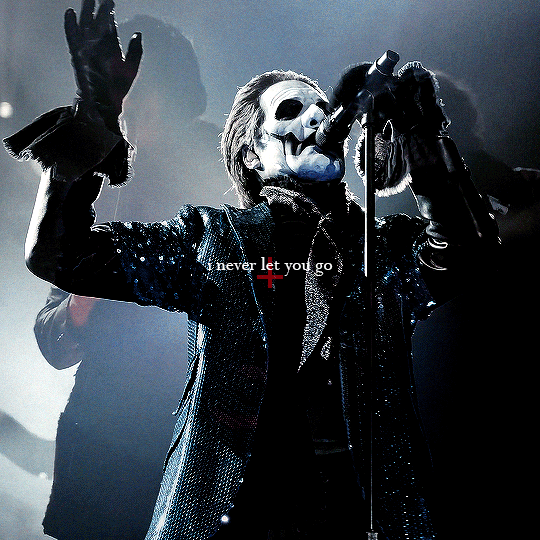
THIRTY-ONE DAYS OF GHOST ⛧ DAY ONE
first song you heard — Mary On A Cross
September 1969; Papa Nihil and the beginning of the Ghost Project take to the stage at the Whiskey a Go Go club in Los Angeles, under the watchful eye of Sister Imperator. Fifty-three years later, in Tampa, Florida, Papa Emeritus the Fourth performs Mary On A Cross, unaware that he is singing the story of his parents—and that of himself.
#note: i'm aware this song is about so much more than the fictional ghost story. just really enjoying that aspect of it rn#very nearly didn't do this series because some people are a bit silly about fans who heard moac as the first song. i'm owning it sdkjcksh#it wasn't the song that made me a fan as i will show in the next post but moac slaps so hard and#if you only like moac and nothing else you're still a ghestie to me <3#not my fault i was on instagram in autumn of 2022#i was going through some stuff then and listening to clips of this pretty song on random videos was something i enjoyed#didn't know the name of it or who sung it but kept hearing it at 4am when i couldn't sleep and everything was falling apart around me#when all i could do was try to escape it until the morning#i feel a bit stupid saying this but when i listen to it now and remember hearing it back then#it's like ghost was there for me even when i didn't know it#waiting for me to find them and everything their music would teach me#until the time was right#ghost31#papa emeritus iv#the band ghost#papa nihil#sister imperator#mary on a cross#user copia edits#user copia all tag#wait for the next tags i'm also tagging:#rite here rite now spoilers#i'm emotional about their messed up little family finding each other right at the very end. they never let each other go#flashing gif#<- ig
381 notes
·
View notes
Text
So...
I've been doing some thinking about a couple of things.
This blog has grown considerably, even from its start and I appreciate each and every one of you so much. Your support never ceases to amaze me and I owe all of you a lot for giving me something to focus on this year instead of spiraling into insanity.
But
Things have gotten a tad bit overwhelming recently between trying to run the blog and trying to write. I find myself either having to ignore the blog to get writing done, or sacrifice writing time and energy to spend time on the blog and keep up with all the replies/reblogs/asks etc. Definitely not complaining, you all never cease to amaze me.
But, I am just one person and my brain only has so much power right now. So, I'm planning to take some (more) time off each week right now while I focus on writing and planning since we're getting into some serious plot stuff soon. So I'm planning to be on the blog three days a week for a while: Saturday, Sunday, and Thursday. That gives me some time to get some writing done as well as some time to rest my brain.
Saturday and Sunday of course to post the chapter and respond to replies and reblogs so I don't get super behind. Monday I'll have some asks queued up as well as maybe a few reblogs. I'll still use the queue Tuesday and Wednesday for reblogs/asks with spoilers as usual. Thursday I'll be on the blog answering asks from Monday - Wednesday as well as things I get that day. I'll queue up a few things for Friday since that day gives me a little break between to prepare for the weekend and posting the chapter.
I'll probably add more days as time goes on. You can still send in asks on the days I'm gone, but just know I won't see them or respond to them until later in the week. I already get behind by a couple days on asks anyway so that's not much of a change.
Don't feel bad for sending them either, I love getting all these asks, I just tend to get behind on days I spend more time writing.
The second order of business
has to do with my taglist. Most of you probably haven't noticed (which I don't blame you lol) but my taglist has gotten very big. Very, very big. It's just over 230 people right now, and I'm sure there will be others asking to join. It's quite time consuming to do all of these tags for every chapter (especially since we can't tag in blocks anymore) so I've been doing some thinking into how I can make it easier for me, and for you.
I know there's at least one blog I've heard of, though I'm sure there's more, that have made side blogs that they have people follow and turn on notifications for and just make a post on that blog when they post a chapter or fic, etc. I've been considering doing that since the taglist is a lot of work and time.
I've also seen blogs that have side blogs that just post chapters/fics and nothing else. I know quite a few of you only follow for the fic, so if anyone is interested, I could put together a side blog like that as well that you can follow and get notifications from instead of having to follow this blog and having to go through the probably 100 posts that I make a day 😂 (at least it feels that way for me)
Having a separate blog for the taglist too would allow me to schedule posts so I can have them come out a bit earlier than I get up for those of you across the world who stay up to read and have to wait for me to post in the morning when I get up (or later like today because I slept in). Of course Ao3 will get posted later because I can't schedule posts there, but at least for Tumblr I can have things post earlier.
So let me know what you think about the taglist side blog and the possible just chapters/fics side blog. Feel free to send in asks (anonymously or not) with your opinion. I might not answer them all (not tonight because my brain is fried and honestly i'm not sure if this is even comprehensible English) but I will at least use them to make the decision (or make a post with all of them and answer it as just one).
#more than likely i'll be doing the taglist blog just for my own sanity#and wrists#I'd tag everyone on the taglist in a post on that blog just so everyone sees it#also will still use the taglist for a chapter or two so everyone can have a chance to follow there#also don't feel bad for asking to be on the taglist#it's just gotten very long#and scheduling posts is so nice#it was very handy last year for Kinktober#anyway let me know what you think
191 notes
·
View notes
Text
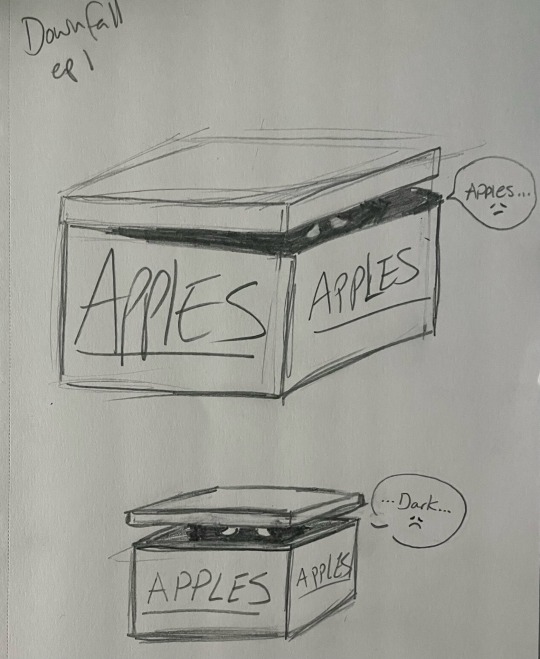
WATCHED C3e99 DOWNFALL PART 1 AND UHHH I HAVENT DRAWN FAN ART IN YEARS BUT THE MUSE REALLY SPOKE TO ME THIS TIME
Step 2 figure out how the Emissary actually looks
#I VOTE WE JUST CALL HIM APPLES#my sibling and I were watching together and I was like noshir STILL hasn't come in yet I bet he's in the fucking crate#and then#Apples <3#BE APPLES#I've solely been referring to the emissary as Apples in all of our conversations okay I love him#im big in love with Asha tho I am very excited to see what the rest of downfall brings us#I feel like my brain was going 7000 mph the whole episode trying to remember every scrap of lore I could remember#idk maybe more art to come I guess???#everyone thank my good buddy P who can not see this post as it will be spoiler tagged for them but they somehow unlocked my art block#by introducing a What If Ashton Draws As A Coping Mechanism AU and I went slightly feral over it <33#critical role#exu downfall#critical role campaign 3#god my tagging system has gone to shit there is so much goin on#bells hells#it's not BH but that's what all the rest of the C3 stuff is tagged with so im just gonna do that for my own searching purposes I guess#sams art#cr downfall
208 notes
·
View notes